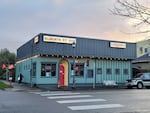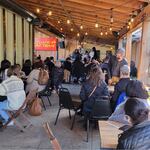In March of 2020, salesperson Hank Failing was stunned by what he saw in Portland’s music stores. Just like toilet paper and hand sanitizer, guitars and amps were in short supply.
“Shops couldn’t keep enough inventory in stock,” says Failing, who’s worked in Oregon music stores for nearly 25 years.
It seemed counterintuitive. The city’s economy, as a whole, was in a terrible state. But Failing says many musicians who were stuck in their homes decided to upgrade their equipment. Others took up learning an instrument for the very first time.
Meeting customers where they’re at
Business was booming, but, like millions of Americans, Failing soon found himself unemployed. He left the music retail workforce due to health concerns at home.
“Our situation is different just because my wife has had a double lung transplant,” Failing says. “She’s one of those people that’s going to be in a really bad place if she gets COVID.”
But the emergence of vaccines changed his mind about working in a storefront.
In January, Failing opened his own used instrument shop — Hank’s Music Exchange. Two months in, business is exceeding his expectations, but it isn’t exactly back to normal.

Hank Failing is a first-time business owner. He opened Hank's Music Exchange, a 350-square-foot used instrument and gear shop in Southeast Portland, in January of 2022.
Sarah Nienaber
“Eighty-five to 90% of all of our business starts on Instagram right now,” Failing says of the increase he’s seen in online window shopping from customers still hesitant to browse inventory in-person.
“That sounds a little nuts, but Instagram is so easy to show people stuff.”
Amid concert hesitancy, venues continue to struggle
Hank Failing’s story is a microcosm of the uneven recovery of Portland’s music economy.
According to MusicPortland, a nonprofit advocacy group, the overwhelming majority of the city’s more than 800 music businesses are small and independent. While some — particularly manufacturers and retailers — have flourished during the pandemic, those that rely on public gatherings continue to struggle.
“Obviously venues suffered deeply and the musicians just catastrophically,” says Meara McLaughlin, MusicPortland’s executive director.
McLaughlin says concert attendance hesitancy remained a big disruptor in February, with most of the state’s music venues operating at nearly half capacity. Concerts are typically underwritten by food and alcohol sales. She says smaller crowds and an increase in no-shows at the box office have blunted once-reliable revenue streams for music venues.
“They’re not making [income from] the other things that [pay] for their staff and everything else,” says McLaughlin. “It is a hard, thankless job.”
MusicPortland aims to help. The group recently proposed a 7-point plan it believes will ensure the survival of Portland’s music scene.
The group’s statewide sister organization, MusicOregon, helped craft legislation that would recognize Oregon’s commercial music industry as an emerging economic sector. The Oregon Legislature did not pass House Bill 4048 during its 2022 session, but the bill’s provisions were repackaged and passed inside a larger budget bill, HB 5202, which currently awaits the governor’s signature.
McLaughlin believes that could usher in regulatory reform and tax incentives for music businesses. But right now, those potential developments seem out of reach for Portland’s beleaguered live music venues.

Alberta Street Pub in Northeast Portland.
Courtesy of Niki Way
“We had two PPP loans and two grants and that’s really the only reason why we’re still here,” says Ezra Holbrook, co-owner of Alberta Street Pub located in Northeast Portland.
In recent months, business at the pub and 100-person capacity music hall has stabilized.
“We’re in the break even to maybe even making-a-little-money-possibly territory,” he says.
But the financial and emotional toll of the pandemic has left him perilously close to burnout.
“I’ve come this far but I don’t know how much further I can go,” says Holbrook.
A boost from new small business owners
There is some good news on the horizon. Nationwide, small business ownership has rebounded to pre-COVID numbers. Women and people of color make up a large portion of those new entrepreneurs.
Portlander Niki Way will join the ownership group at Alberta Street Pub as a managing partner later this month. Way, who is a Filipino-American, says the economic turmoil of the past two years has also created opportunities for people like her who are willing to take calculated risks. She’s funding her stake in the pub with capital raised from selling a home she purchased and renovated in 2017.
“I definitely know that this is a huge gamble,” says Way, a veteran bar manager who’s worked in the service industry for over a decade. “I still believe that the live music venue is still going to be a viable place in the future. The community needs a place like this.”

Alberta Street Pub in Northeast Portland. During the pandemic, the pub has moved many concerts to an outdoor patio area with a limited capacity.
Courtesy of Niki Way
Alberta Street Pub’s Holbrook welcomes his new partner’s enthusiasm. He says first-time business investors like Niki Way at Alberta Street Pub and Hank Failing at Hank’s Music Exchange are bringing much-needed energy, financial resources and new ideas to Portland’s slowly rebounding local music economy.
“Small businesses — that’s what gives a community character. If only the deep pockets survive, you end up with a town full of Red Robins,” says Holbrook.
“People like Hank and Niki are saving our asses. And frankly — helping save the town’s ass.”
Editor’s note: This story has been updated to correct information about legislative proposals to support music businesses. Although Oregon House Bill 4048 did not pass during the 2022 session, the bill’s provisions were recently repackaged and passed inside a larger budget bill, HB 5202, which currently awaits the governor’s signature.

